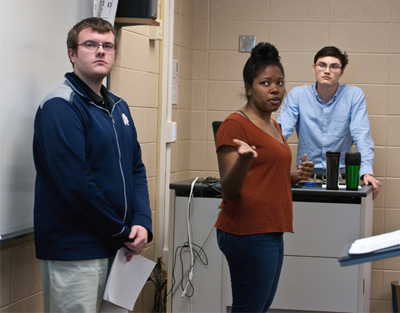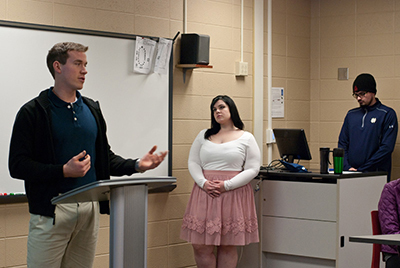
Holy Cross senior Laura Boykins didn’t consider how much her consumption – from food to clothes to hair care products – affected the environment until she traveled to India and South Africa. The experience opened her eyes to the ways in which people in the United States overuse resources.
“The first time I was introduced to sustainable living, I felt like I changed my whole lifestyle,” she told her class during a series of group presentations Dec. 12 that capped off a first-of-a-kind course examining sustainable living and the Holy Cross Charism on the campuses of Notre Dame, St. Mary’s and Holy Cross.
Six groups of students described how the campuses could boost the management of natural resources and increase sustainability practices – all while enhancing commitment to Catholic social teaching. Students from each school were enrolled in the two-credit interdisciplinary class that rotated weekly among the campuses. The class grew out of a series of discussions among faculty about how they could collaborate to promote sustainable education, and was taught by a team of professors from the three campuses, including Chris Cobb (St. Mary’s), Mike Griffin (Holy Cross), Margie Pfeil (Notre Dame), Andrew Polaniecki (Holy Cross) and Rachel Novick (Notre Dame).
Students tackled a variety of topics, researching how other campuses around the country instituted potential solutions and suggesting programs that could be instituted here.
 James Walters, Laura Boykins, and Tai Verbrugge suggest an overall sustainability plan to decrease overall carbon emissions, reduce food waste, conserve water and promote renovation and sustainable buildings.
James Walters, Laura Boykins, and Tai Verbrugge suggest an overall sustainability plan to decrease overall carbon emissions, reduce food waste, conserve water and promote renovation and sustainable buildings.
“Rather than just a class on one campus that students from another campus are enrolled in, this is a full-fledged collaboration that fully recognizes how much we all have to learn from each other when it comes to building sustainable communities,” said Novick, director of the sustainability minor at Notre Dame.
The three coffee shop franchises on the Notre Dame campus, for instance, sell beverages in nearly 208,000 disposable cups a month, according to students Alicia Czarnecki, Madison McMullen, Reagan Mulqueen and Carolyn Yvellez. The university could offer free, personalized cups containing Radio Frequency Identification (RFID) to each incoming freshman that would link beverage purchases to their student accounts. Fees paid by upper classmen who continue to use their cups would offset the cost, and all students would be offered beverage discounts as an incentive to use their cups.
 From left: George Sutherland, Alexis Petersen, and Dylan Kennedy describe how growing a small orchard of apple and pear trees on the Holy Cross campus will promote volunteerism and sustainability and how it aligns with Catholic social teaching.
From left: George Sutherland, Alexis Petersen, and Dylan Kennedy describe how growing a small orchard of apple and pear trees on the Holy Cross campus will promote volunteerism and sustainability and how it aligns with Catholic social teaching.
Another group suggested starting a bike share program for all three campuses, in addition to building a bicycle repair shop near the Hammes Bookstore. Other teams researched and offered solutions for composting waste, creating a hyper-local food source by planting a 10-15 tree apple and pear orchard on a half-acre parcel on the Holy Cross campus, and creating a sustainability plan for all three campuses that addressed issues including water usage and building renovation.
 From left: Jonathan Hake, Margaret Carswell, Megan Santos and Benjamin Zeledon share how a bike rental program could unite the campuses of Notre Dame, St. Mary’s, and Holy Cross.
From left: Jonathan Hake, Margaret Carswell, Megan Santos and Benjamin Zeledon share how a bike rental program could unite the campuses of Notre Dame, St. Mary’s, and Holy Cross.
The student group of Emily Clements, Jennifer Hagenauer, Ian Klupar and Hunter Ostapowicz described how installing a rain garden – an area of deep-rooted native plants surrounded by a permeable berm of natural mulch or rock – can prevent the flooding that occurs from building or parking lot runoff at Holy Cross. Native, deep-rooted plants are more sustainable than grass, which requires a never-ending cycle of mowing and watering, Klupar noted.
Boykins was not the only student who emerged from the class with a rejuvenated attitude about sustainability. Novick said the class significantly influenced many other students’ choices in areas such as energy conservation and food purchasing. But, she said, “Perhaps my favorite aspect of the course was that we were able to include Holy Cross priests and brothers in our classroom conversations. It was very meaningful for the students and faculty to be able to engage Holy Cross religious on these challenging topics, and to foster an inter-generational dialogue on the meaning of sustainability in the context of our shared Holy Cross charism.”
“I think the most important outcome of the class is the recognition that we are all in this together, both in the local sense of the Holy Cross campuses and in the global sense of the one human family,” Novick said.